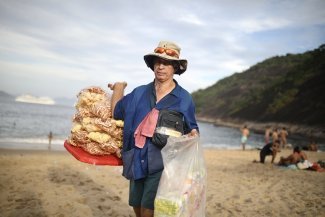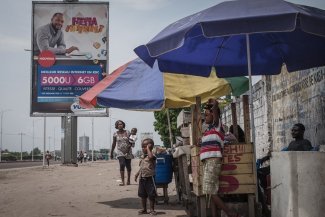Almost a quarter of Tongans over the age of 30 suffer from Type 2 diabetes. Every weekday Vaiola Hospital’s diabetes clinic in the Tongan capital of Nuku’alofa is crowded with patients. Many are in wheelchairs and have had a foot or leg amputated because of diabetic foot infections or sepsis.
At first impression the Royal Kingdom of Tonga in the South Pacific is the very embodiment of an imagined tropical paradise.
Coconut trees sway in a warm ocean breeze, the pace of life beats slower and the people are laid-back and friendly.
Even the name of its capital Nuku’alofa means “abode of love”.
But today there’s big trouble in this little known Polynesian nation, which lies 2,400 kilometres north of New Zealand.
And the trouble is Tonga’s obesity epidemic.
According to a recent academic paper published by the UK medical magazine Lancet, Tonga is now the “most obese country in the world”.
Today over 90 per cent of adults in this island nation of 107,000 people are either obese or overweight using the internationally-accepted BMI (body mass index) rating, which calculates levels of obesity from a person’s height, weight and build.
Equally worryingly, the World Health Organization (WHO) says that almost a quarter of Tongans aged over 30 years are now suffering from Type 2 diabetes.
Many Tongans, it would appear, are quite literally eating themselves to death. This is also true of seven other Polynesian states, including Fiji, Samoa and American Samoa, which are also amongst the world’s ten most obese nations.
In Tonga, average life expectancy has dropped from 72 ½ years in 2012 to 67 years today. And this former British Protectorate is now facing an epidemic of non-communicable diseases (NCDs) such as cardiovascular diseases and respiratory illnesses, which are all linked to diabetes, as highlighted in a recent report by the Asia Pacific Observatory on Health Systems and Policies.
Few families in this archipelago of 170 islands have escaped the scourge of diabetes, which in Tonga is predominantly caused by the sedentary lifestyle of its citizens and the lack of fruit and vegetables in the modern Tonga diet.
Another major contributing factor is the popularity of imported ‘junk’ meat such as tinned corned beef, cheap chicken, turkey tails and ‘mutton flaps’ – a fatty cut of lamb removed from beneath the ribs that is seldom sold in New Zealand, where it is sourced, but imported to the South Pacific instead.
Tsunami of obesity and diabetes
A visit to Nuku’alofa’s Vaiola Hospital graphically illustrates the tsunami of obesity and diabetes that is threatening to overwhelm this island nation.
Every weekday the hospital’s diabetes clinic is crowded with patients waiting for treatment.
Many of them are in wheelchairs and have had a foot or leg amputated because of diabetic foot infections or sepsis. Others have foot ulcers or have had a debridement in a bid to stop infection spreading through their bodies.
During a recent visit to Vaiola Hospital Equal Times met 72-year-old Petilina Malie, who was in the surgical ward waiting to have her left foot amputated.
Petilina, a mother of 12, had been a diabetic for 20 years. A small boil on the heel of her foot had turned to sepsis and the infection was spreading, inexorably, up her leg and threatening her life. Amputation of her foot, after two failed debridements, was the only solution.
Anxiety and fear were etched on the matriarch’s face. Fighting back the tears, her son Leimoni, a 47-year-old fisherman, told Equal Times: “We have to remain strong for my mother. I don’t want to lose her to this disease. I pray to God that today’s treatment will free her from pain and give her some peace.”
Obesity and subsequent diabetes, triggered by poor health choices, had had a devastating effect on the family, Leimoni conceded. Two other relatives were also suffering from diabetes, he said.
“We should encourage people who have not got diabetes to be more aware of what they eat and how they live, to live healthier lives.
“People should be more active and do some physical work, sweat a little; anything that would push away this disease. This means eating right and not just following our tastes and fancies,” he said.
Last year Vaiola’s two surgeons carried out 16 ‘major’ above- and below-the-knee amputations, as well as 43 lesser amputations, such as cutting off toes or the partial or total removal of a foot.
NCDs and so-called ‘lifestyle diseases’ – particularly diabetes and associated cardiovascular and pulmonary diseases – account for 74 per cent of all deaths in Tonga.
In 2000 the country spent the equivalent of US$163 per person on health. By last year the figure had increased to US$245, representing around 12 per cent of total government expenditure.
Almost half of Tonga’s health budget is provided by donor and development funding. Vaiola Hospital, for example, was mostly rebuilt and refurbished with funding from the Japanese International Cooperation Agency (JICA). Other big funders include WHO and the governments of Australia and New Zealand.
The impact of globalisation
Globalisation has been a major factor in feeding the obesity crisis.
In 2004 Tonga was the first Pacific island country to develop a comprehensive health strategy to combat the nascent menace of obesity.
But a year later the country joined the World Trade Organisation, reduced its import tariffs and opened its domestic market to foreign investment.
The result has been an even greater reliance on food imports of relatively cheap fatty meats, refined carbohydrates and other packaged foods with high sugar and salt content.
In essence, many families have abandoned a traditional healthy diet of fish, fruit and vegetables for imported junk food.
“NCDs are the greatest challenge facing my country right now,” Dr. Siale Akauola, Tonga’s director of health told Equal Times.
“In the olden days people used to hunt. They would go fishing and bring the fish from the sea. But nowadays there’s a shop there. What’s available is not always the healthiest choice.”
He continued: “Urbanisation is something that’s pretty new here. We are aware that this is the normal transition of a population being exposed to a new environment, new fast food.
“We have problems in the world today because of the technology of producing food, so fast, so efficient, using a lot of salty, cheap food.
“This is a global problem. We are aware of that, and we are aware it’s not only our nation having a headache over the whole thing,” said Dr. Siale.
Around the world an estimated 600 million people are obese. The number has doubled since 1980.
Most striking of all, perhaps, is the fact that in the last 33 years not a single country has been able to reduce its rate of obesity.
Undaunted, Tonga’s government has now stepped up its fight against the disorder.
Fighting back with a fat tax
Last year the government imposed an additional excise tax – a so-called ‘fat tax’ – of 40 seniti a kilo (around US$0.15) on various imported foods, including industrial chicken, mutton flaps and turkey tails.
And earlier this year Tonga Health, the semi-autonomous health agency spearheading the campaign against obesity, was given new offices at Vaiola Hospital to accommodate its expanded team of 13 health workers.
“Currently we are focusing on physical activity and healthy eating, the two risk factors that really impact our population,” said Tonga Health program coordinator Monica Tuipulotu.
“We Tongans just love to eat. On every occasion we have food. In our culture the more food you serve, the more love you have for that person. And I’m not just talking about a cup of tea. It comes with a lot of carbs, a lot of fats and a lot of sugar and salty foods.
“We know it’s really hard to change the culture and the lifestyle. It won’t happen overnight. It will take a long time.”
Tonga Health also oversees a flagship programme called Mai-e-Nima, or Five-a-Day, which encourages schoolchildren to eat at least five portions of fruit and vegetables a day.
“Tonga is number one with obesity in the world. It’s difficult to change the adults in our generation,” Minoru Nishi, chair of the Mai-e-Nima campaign told Equal Times.
“We need to tackle the problem with the primary school kids because I firmly believe that if we change the kids we change a generation.
“It all comes down to our personal choices and what we eat and drink.”
Petilina Malie has had her left foot cut off because of lifestyle-related diabetes.
In its ongoing battle against obesity it could be said that Tonga, too, is on the operating table.










